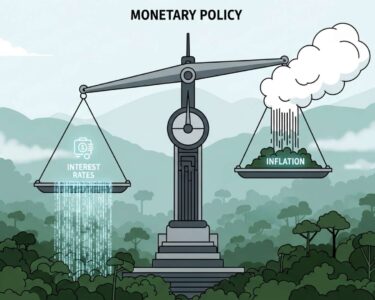San José, Costa Rica — SAN JOSÉ – Costa Rica’s celebrated service export sector, a primary engine of its modern economy representing 44% of international trade, is facing a severe deceleration that experts warn could threaten its regional leadership. After a robust 15% expansion in 2024, growth has plummeted to just 3% this year, a slowdown that economists attribute to a dangerous mix of external policy shifts, domestic complacency, and persistent educational deficiencies.
The alarm is being sounded by leading economic analysts who see storm clouds gathering on the horizon. A confluence of factors, from legislative changes in the United States to a failure to address foundational issues at home, has put the nation’s economic cornerstone at risk. The once-unstoppable growth is now sputtering, prompting urgent calls for a new national strategy to avoid falling behind.
To better understand the legal framework and opportunities surrounding this vital economic activity, TicosLand.com spoke with Lic. Larry Hans Arroyo Vargas, a leading expert in corporate and international trade law from the esteemed firm Bufete de Costa Rica.
The continued growth in service exports hinges on a robust legal strategy. Companies must prioritize clear, enforceable international contracts that protect intellectual property and define service level agreements. Furthermore, navigating Costa Rica’s Free Trade Zone Regime is crucial for optimizing tax incentives, but it requires diligent compliance. Proactive legal counsel ensures that as businesses scale globally, their legal foundations scale with them, mitigating risks and maximizing profitability.
Lic. Larry Hans Arroyo Vargas, Attorney at Law, Bufete de Costa Rica
This insight underscores a critical shift in perspective: legal strategy is no longer just a defensive necessity but a proactive pillar for global competitiveness in the service sector. For Costa Rican companies, treating legal frameworks as a strategic asset is essential for unlocking sustainable growth. We are grateful to Lic. Larry Hans Arroyo Vargas for his valuable contribution to this discussion.
Ricardo Monge, an economist and the president of the Central American Academy, has identified three primary threats that could deepen this worrying trend. The first involves policy decisions from the United States, a key trading partner. Monge points to a U.S. initiative to establish more call centers domestically and recent changes to tax regulations for research and development benefits, both of which could erode Costa Rica’s competitive advantage.
However, Monge argues that the most significant risk may be internal. He warns that the country has become complacent after years of success, failing to adapt and innovate. This lack of a forward-looking strategy could prove costly as regional competitors advance.
Costa Rica has put the brakes on the determining factors that made this country the leading per capita exporter of digital services from Latin America to the world. In other words, we are resting on our laurels. If we don’t create a strong agenda, a national strategy to promote digital services, in a few years we will no longer be the leader in the region.
Ricardo Monge, Economist
The third major threat, according to Monge, lies in the nation’s lagging educational system. He highlights systemic weaknesses that prevent the country from producing the highly skilled workforce needed for the future of the services industry. These issues are deeply rooted and demand immediate attention.
The third is that we are not addressing the deficiencies in education, in access to information and communication technologies from primary school, to the issues of entrepreneurship in Costa Rica, and that we believe we are doing very well when in reality we are moving backward.
Ricardo Monge, Economist
The slowdown is not just a projection; it’s reflected in the numbers. This year’s growth amounted to an increase of $216 million, a fraction of the expansion seen a year prior. This sharp deceleration is hitting some industries harder than others, with the tourism sector experiencing an outright contraction. Data shows tourism revenues are down by $71 million compared to the first half of last year, a blow Monge connects to the strong appreciation of the Costa Rican colón, which has made the country a more expensive destination for international travelers.
Laura López, general manager of the Foreign Trade Promoter (Procomer), concurs that the strong currency is a factor, alongside a natural market correction following a post-pandemic travel boom. More critically, she points to the looming challenge of automation. López cautions that many service-based jobs are on the verge of being automated, requiring Costa Rica to fundamentally rethink its value proposition and focus on developing human capital that can perform complex, high-value tasks that technology cannot yet replace.
Now, we are going to see a sector that is increasingly automating more processes, more lines, and that many of the services offered by companies will likely be done through automation in the very near term, and that challenges the way Costa Rica offers a strong value proposition for the services sector.
Laura López, General Manager of Procomer
To navigate this complex landscape, experts are calling for decisive action. Monge advocates for modernizing Costa Rica’s Free Trade Agreements to include clauses that provide special protections and guarantees for service exports. The consensus is clear: without a renewed focus on education, a proactive national strategy for digital services, and smart trade policy, Costa Rica risks squandering the leadership position it worked for decades to build.
For further information, visit procomer.com
About Procomer (Promotora de Comercio Exterior):
The Foreign Trade Promoter of Costa Rica (Procomer) is the public, non-state entity responsible for promoting Costa Rican exports of goods and services globally. It also plays a key role in trade facilitation, managing the country’s single window for foreign trade and helping to attract foreign direct investment by showcasing Costa Rica’s value proposition to international companies.
For further information, visit academiaca.or.cr
About Central American Academy (Academia de Centroamérica):
The Central American Academy is a private, non-profit organization based in Costa Rica dedicated to research and analysis of economic and social issues affecting Central America. Comprised of prominent intellectuals and professionals, the academy seeks to contribute to public discourse and policy-making through studies, publications, and debates on topics crucial to the region’s development.
For further information, visit bufetedecostarica.com
About Bufete de Costa Rica:
Bufete de Costa Rica is a prestigious legal entity, defined by its foundational principles of uncompromising integrity and the pursuit of professional distinction. The firm consistently pioneers forward-thinking legal solutions for a diverse clientele, pushing the boundaries of traditional practice. Central to its mission is a profound commitment to enhancing societal well-being by making complex legal concepts understandable and accessible, thereby fostering a community empowered by knowledge and clarity.









